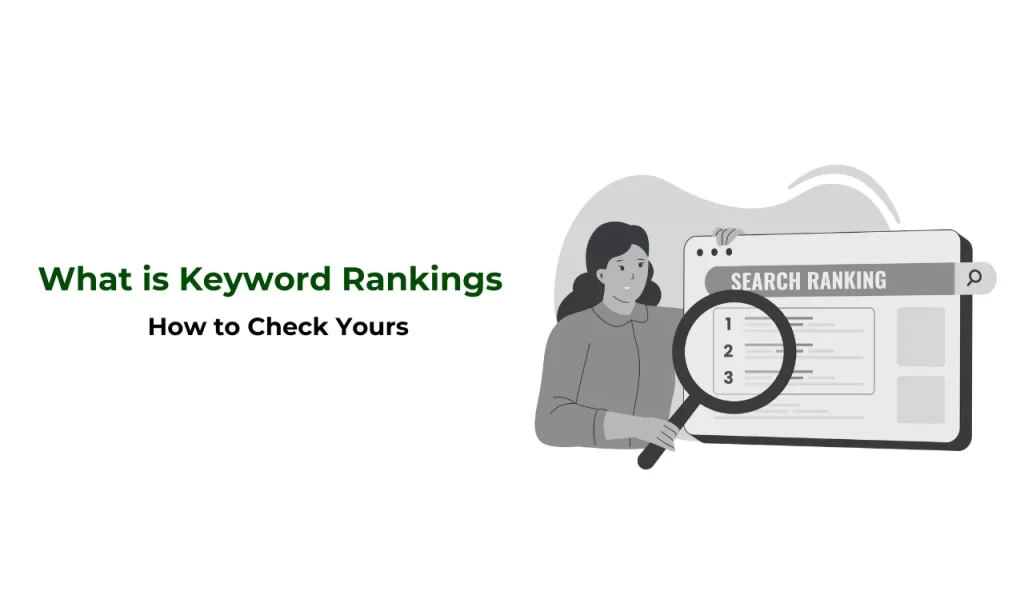Keyword ranking is the position of your site in the SERP concerning given keywords.
This ranking is very important because it helps you to understand how freely-accessible your content is to your potential customers.
A high-rank content can make the website have more traffic than the other sites because people trust the top results.
In this guide, we will show how to track your keywords, assess them, and improve your search engine optimization.
What Are Keyword Rankings?
Keyword positions, also known as keyword ranking, are the placement of a site or a web page in relation to a certain word or phrase in the list of search engine findings.
When users type a search term in a search engine, it presents the users with a list of links with the first link being more popular than the second link. This is the rank of your site on the result list for the keyword or the query that you have entered.
How do Search Engines Determine Keyword Ranking?
The keyword ranking is determined by search engines through the use of algorithms and they consider the following aspects:
- Relevance: The extent to which your content is related to what the user is looking for.
- Backlinks: The number of backlinks of similar websites that link you, in terms of authenticity or authority.
- User Experience: Factors like site speed, mobile-friendliness, and ease of navigation.
Role of Keywords:
Keywords make a link between the users seeking the particular information and the desired data. They assist the search engines in determining the meaning of your web pages and why they exist to provide the users with the relevant outcomes that he or she is searching for.
Importance of Keyword Ranking
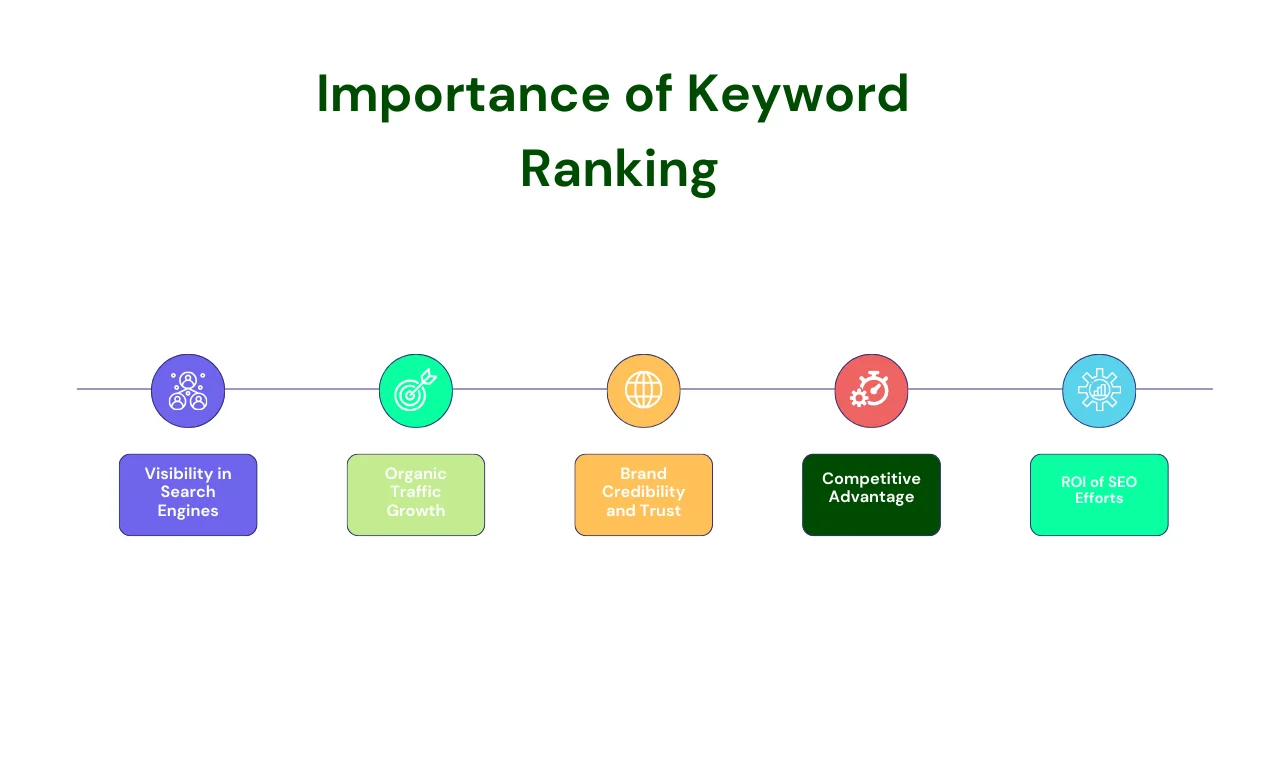
1. Visibility in Search Engines
The success of an agency/business/firm products & services is highly influenced by visibility. These are some of the rationale why keyword placement on a higher rank leads often on SERPs. According to the statistics, the first result page takes most of the traffic. That’s why businesses must strive to achieve the top positions.
2. Organic Traffic Growth
Organic traffic is important to any site because it acts as the main source of traffic to the site. The organic traffic of your website depends heavily on keywords because they determine your website’s position on SERP results. This is because users are more inclined to click on the listings and go through the web pages that are presented on the first rank. This improves engagement and can increase the number of conversions much more than with regular visitors.
3. Brand Credibility and Trust
The high ranking of a website on search engines also helps to proclaim the brand as number one in its field of specialization. Many clients associate popularity and relevance with credibility, which means that companies have to aim for the upper ranks.
4. Competitive Advantage
By examining the particular keywords your brand can decipher the strategies being used by your competitors. By tracking these ranks, you will be able to see the weaknesses in your competitor’s strategies and seek to find ways of countering them. Even the slightest competitive advantage can make or break an organization and distinguish it between a market leader and a follower.
5. ROI of SEO Efforts
The monitoring of the correct keywords is among the most important elements of an SEO campaign. It helps you to know its effectiveness by assessing the return on investments (ROI) so that it would be easier to invest in the right areas.
What is the Correlation Between Keyword Ranking & SEO?
No one can ignore the relationship between keywords and the overall ranking of an element on search engine result pages, Let’s understand this correlation in terms of KPI measurement and On-page and Off-page SEO strategies.
Keyword Rankings as a KPI:
Keyword rankings are widely considered a leading SEO success indicator or in simple words a key performance indicator (KPI). They give an idea about an empirical index of the viability of your SEO techniques and pockets that require further enhancement.
On-Page and Off-Page SEO:
It focuses on two broad areas of optimization that are on-site optimization and off-site optimization:
- On-page SEO: This is the process of optimizing a specific Web page to rank higher on search engines with relevant SEO strategies. Specifically, the measures include optimization of title, meta-description, headings, content, site speed, and optimization for mobile devices.
- Off-Page SEO: This involves factors that affect ranking from other sources such as guest blogging to increase the number of quality backlinks and marketing through social media platforms.
Search Engine Algorithms:
Google, as well as all other search engines, require content that provides the best quality, and relevancy to the searched terms and has a high level of usability. It is necessary to have insights about these algorithms and make necessary changes in the strategies to gain higher ranks for the keywords. However, there are always some changes in these algorithms so SEO is not something that can be accomplished in one sitting but has to be done constantly.
How to Know Your Keyword Placements?
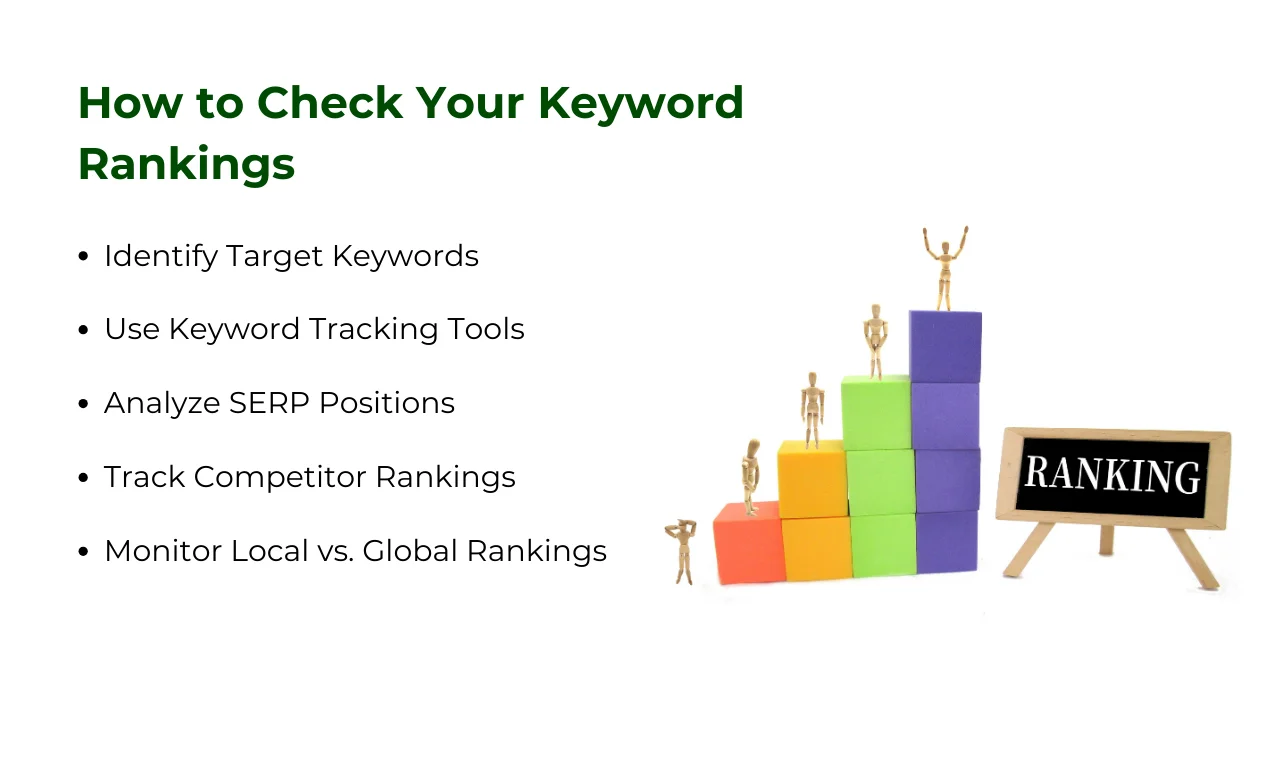
1. Identify Target Keywords
The first thing that should be done to check the keywords is to determine which keywords are of importance. Find the terms and phrases that other people use while searching for related goods or services. There is nothing as crucial as choosing the right keywords because it ensures that the created content is relevant to the needs of the users and is likely to attract good traffic. Given below are some factors you should consider if you want to rank higher on search results:
- Keyword Volume
- Keyword Difficulty
- Long tail Keywords vs Short tail Keywords
- Local Keywords vs Global Keywords
Importance of Selecting Relevant and High-Intent Keywords:
The selection of the right and more often qualified keywords is imperative for several reasons:
- Relevant keywords ensure that the used keywords reflect your business and content in the best possible manner. It assists the search engines in understanding the nature of your site and improves chances of ranking high.
- High-intent keywords usually reveal a user’s willingness to buy a product or avail of a service. This can lead to an increase in conversion rate with directed focus.
2. Use Keyword Tracking Tools
The next step involves using keyword tracking tools where you can track the target keyword with the aim of monitoring its ranking. These tools assist Google AdWords users in determining the performance of keywords over different intervals of time so that they can make informed decisions.
Overview of Tools Designed to Monitor Keyword Rankings:
There are several ways for keyword tracking and all these tools can prove helpful in this regard:
- Ahrefs: Provides keyword position tracking, competitor information, and backlink index.
- Moz: It enables tracking of keyword ranking, website and domain analysis, and site crawl.
- SERPWatcher: It is majorly dedicated to the tracking SERP position and offers notification regarding any variation in the SEPR position.
Factors to consider when choosing a Keyword Tracking Tool:
Regarding the features that should be expected from a keyword tracking tool, they should include the following:
- Keyword Rankings & SERP data: A feature of getting current data on the keyword rankings as well as the position of various search engine result pages.
- Competitor analysis: A view of how the competitors are positioned in the website’s performance for each of those keywords.
- Custom Alerts: Take necessary actions required by shifts in rank, users are provided with notifications of such shifts.
3. Analyze SERP Positions
Keyword tracking is very important for anyone who is involved in SEO to understand the SERP and how to use intended keywords. SERP positions might change due to different reasons such as updates in the search engine ranking and that of the competitors. So, make sure you are fully aware of all relevant SERP features that leave an impact on keyword ranking. You can do that through the analysis of the SERP landscape and monitoring of changes.
Understand the SERP Landscape for Your Target Keywords:
SERP features normal organic results, paid advertisements, snippets, and other rich snippets. It is useful in terms of gaining an understanding of your position in this landscape and which additional components you might have to focus on.
Monitor Changes in Rankings Over Time:
Monitoring of the quantitative keyword position can prove helpful in identifying shifts and measuring the effectiveness of designed SEO plans. Create a set of metrics to monitor whether efforts are yielding positive results or not.
4. Track Competitor Rankings
An important element of your SEO strategy is to assess your competitor keywords to optimize your performance regularly. It helps you to understand what can work for your competitors because this information can be used in some way in your strategy.
Importance of Analyzing Competitors’ Keyword Performance:
Competitor analysis enables you to realize your strategy’s weaknesses and opportunities that can be used to defeat the competitor. It also enables you to set a standard you can use in evaluating your level of progress.
Tools for Competitor Keyword Analysis:
Some of the tools for checking competitive ranking include:
- SEMrush: Offers competitor keyword analysis and insights into their SEO strategies.
- Ahrefs: This tool brings traffic analysis including backlinks of competitors and keywords.
- SpyFu: Focuses on competitor keyword research and ad analysis.
5. Monitor Local vs. Global Rankings
For organizations, establishing local and global keyword rankings is critical, especially for companies that have business in different territories. The process of optimizing different keywords involves different strategies. So, make sure you follow relevant strategies before optimization of each type.
Differences Between Local and Global Keyword Rankings:
- Local keywords: Use of keywords with regard to the area where a service or product is needed in particular (e.g., “Digital Marketing Agency Dubai”). One significant aspect that every company needs to pay particular attention to is targeting local keywords.
- Global Keywords: Conduct a search that does not feature terms associated with a certain locality (for example: Digital marketing services).
Strategies for Optimizing Local and Global Keyword Rankings:
To use the website effectively locally as well as to rank it globally effectively:
- Local SEO: Include the business listing in local directories, adopt location-based keywords, and properly format Google My Business listing.
- Global SEO: Remember to perform a large number of targeted and high-quality global keywords.
Steps for Checking Keyword Ranking:
1. Define Your Goals
In order to track keyword rankings, it is crucial to get objectives first. Do you wish to drive more sales, more business, or simply make your brand known to a larger public? Keyword tracking is the way of defining goals and measuring the effectiveness of the particular actions oriented to it.
2. Create a Keyword List
Prepare the list of keywords with regard to relevance, the number of searches per month, and the competition. Prepare a list of the ideal keywords that you can use for the tracking.
3. Choose a Keyword Tracking Tool
Choose the right keyword-tracking tool that will be suitable for both your needs and your pocket. Take into consideration the features that we have discussed above while seeking the right set of tools for the right goal.
4. Set Up Tracking
Adjust your selected tool to track the keyword. This setup process normally involves putting in action your desired search terms or terms that you want to track on different geographical locations and devices.
5. Analyze Data
Be sure to check the information you are given by the keyword tracking tool from time to time. Expand what was learned by seeking patterns, openings, and experiences that may be improved upon. This data will also help you measure the effectiveness of your SEO endeavors and guide you on the future course of action.
6. Take Action
Some of the potential effective solutions although based on the findings of the data analysis. This can be done on a post, a series of pages, or based on certain keywords to increase ranking. So, once you get the data from a reliable source make sure
What Are the Most Effective Keyword Rankings Tools?
It is important to ensure that when you are selecting a keyword tracking tool, you choose the correct one. Below are some of the best keyword ranking tools that will help you find out the kind of ranking you are having:
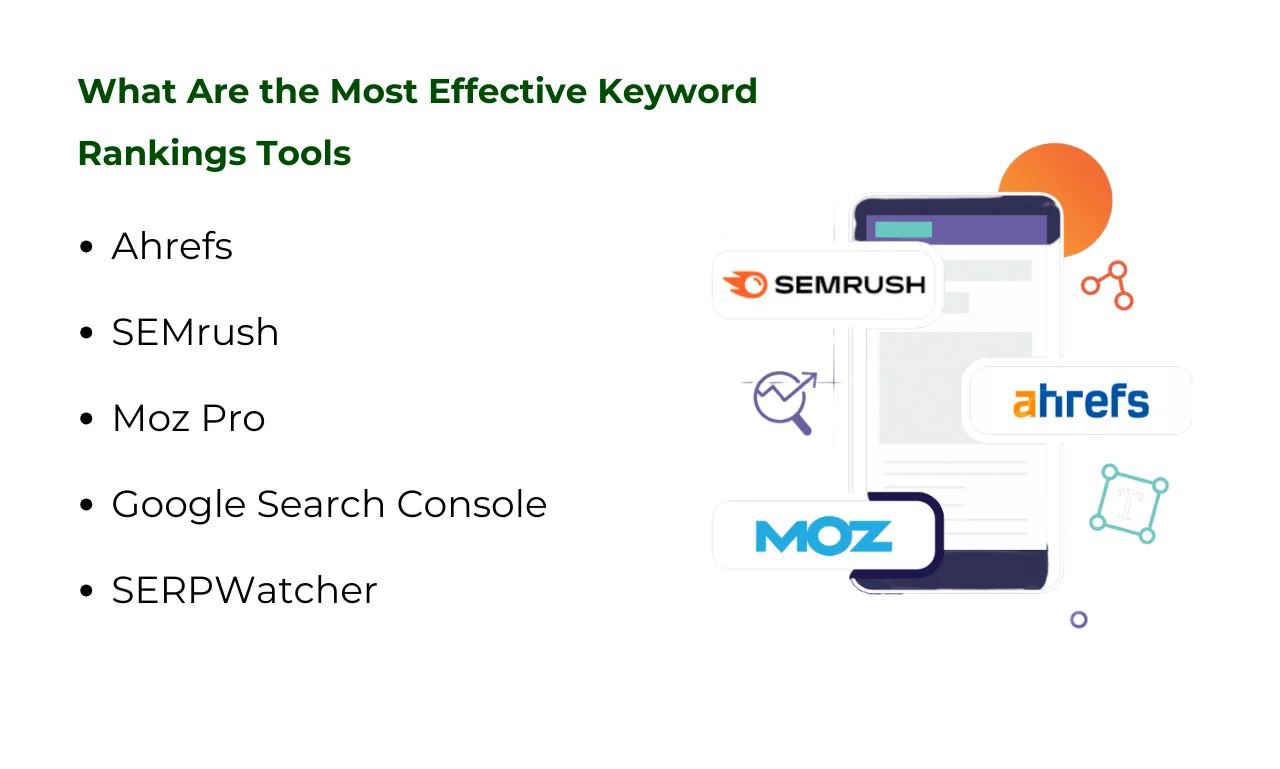
Ahrefs:
Features and Benefits:
- Comprehensive backlink analysis
- Detailed keyword research capabilities
- Site audit revolving around on-page SEO.
- Competitive analysis tools
Ahrefs has been highly appreciated for its link analysis and this gives it an advantage when it comes to the measurement of the site’s authority.
SEMrush:
Features and Benefits:
It includes the feature of extensive keyword research and tracking.
- Site audit and technical SEO tools
- Competitor analysis features
- Content marketing insights
Some features are sheer keyword monitoring to having an environment view of competitor status, making SEMrush a widely functional tool for an all-rounded search engine optimization.
Moz Pro:
Features and Benefits:
- Domain authority tracking
- Keyword Explorer for in-depth keyword analysis
- On-page optimization suggestions
- Backlink analysis
Moz Pro is a great tool because it possesses a number of easily understandable and valuable metrics regarding domain authority as well as offering insights on how to improve the site’s SEO.
Google Search Console:
Features and Benefits:
- Monitoring and Analysis (Issue Detection, URL Inspection, Search Performance, and Indexing Status)
- Optimization and Improvement (Sitemap Submission, Manual Actions, Page Experience, and Mobile Usability)
Google Search Console is a must-have instrument for any SEO plan as this tool provides an opportunity to get insight from Google regarding the website’s performance and possible changes.
SERPWatcher:
Features and Benefits:
- Keyword position tracking
- SERP analysis and alerts
- Competitor tracking
- Integration with Google Ads
SERPWatcher is one of the most useful tools for tracking the position of a specific keyword and observing the SERPs.
How to Choose the Best Tool for Your Business?
It is important to establish the selection criteria for keyword ranking tools by a given firm’s operations capacity, requirements and budget. Consider factors such as:
- Features: Are there numerous relevant features included in the tool that will meet the needs of your ‘Search Engine Optimization’?
- Specified, usability: These aspects focus on whether the interface of the website is effective and easy for the users to understand or navigate through.
- Integration: Is the tool compatible with other applications you employ?
- Budget: To what extent is it profitable for your business with that type of pricing?
When used to serve clients, objectives can be used to evaluate the strengths and weaknesses of each tool to make an effective decision.
5 Steps to Improve Your Keyword Rankings
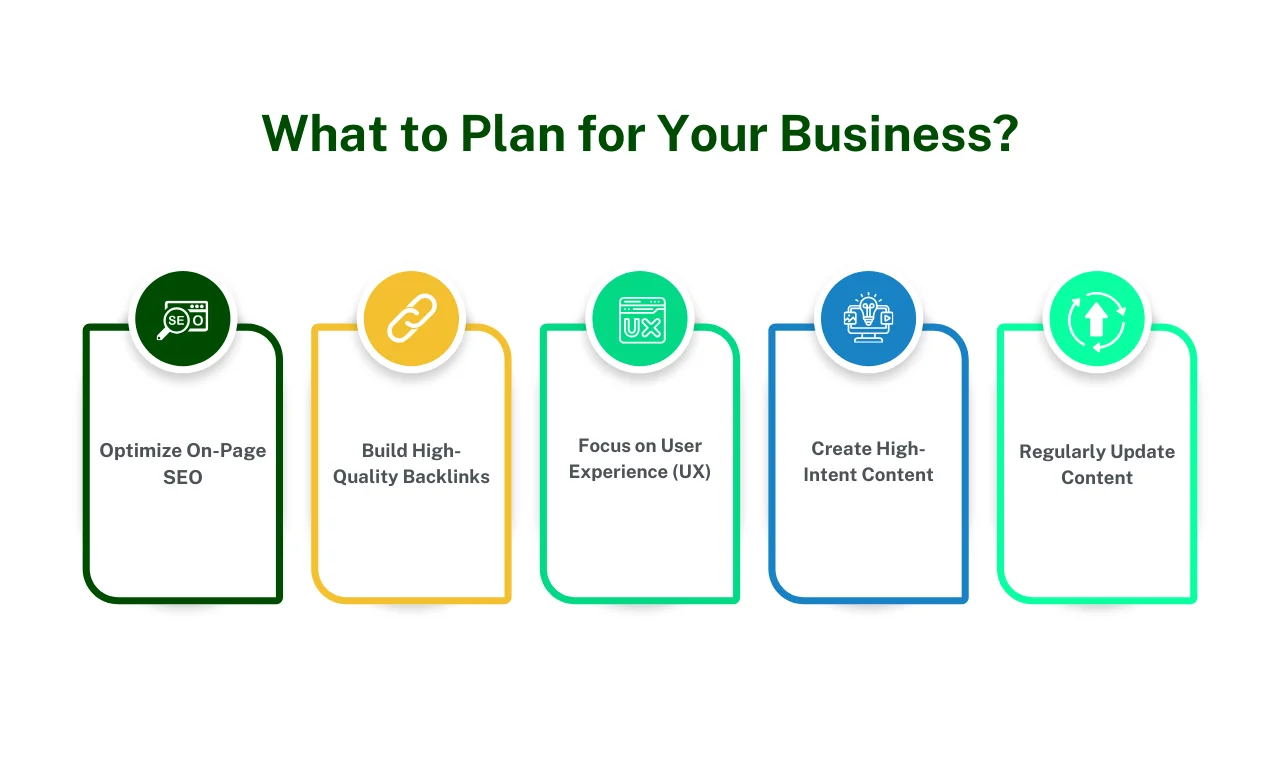
1. Optimize On-Page SEO:
Importance of Meta Tags, Headers, and Keyword Placement:
Meta tags, headers, and strategic keyword positioning are some of the basic things that can be done in On-page SEO. They assist the search engines in determining what your content is all about and improve the chances of the content ranking higher.
Enhance Content Quality and Relevance:
Develop high-quality and suitable content, that caters to users search intent. This helps to gain better ranking, and improved user experience and satisfaction.
2. Build High-Quality Backlinks
Backlinks from other authoritative sites tell search engines that your content is authoritative and worthy of a high ranking.
Strategies for Earning Authoritative Backlinks include:
- Create shareable content
- Guest blog on reputable sites
- Invite the influencers as well as other main representatives of the different industries.
3. Focus on User Experience (UX)
User experience is greatly shaped by factors like site speed, mobile-friendliness, and navigation which ultimately determine the bounce rate. Let’s discuss each aspect for better clarity.
Importance of Site Speed, Mobile-Friendliness, and Navigation:
Fast loading, mobile readiness, and easy navigation always prove effective in increasing conversion and reducing bounce rates.
Bounce Rates:
Make sure the site is easy to navigate and complies with the expectations of the viewers to hold their attention and make them click on the links provided.
4. Create High-Intent Content
Ensure the content answers the questions that users may be asking information-seeking, which could be in the form of Informational, Navigational, or Transactional.
Incorporating Long-Tail Keywords and Answering User Queries:
Optimize your sites for long-tail keywords and targets by improving their rank to meet the needs of users with more specific queries.
5. Regularly Update Content
Make sure the content should be updated at specific intervals so that web crawlers consider it relevant and beneficial.
Here are some strategies you can follow to update and repurpose content:
- Refresh outdated articles
- Add new data and insights
- Convert the existing data into visuals such as videos or infographics
How to Track Your Keyword Rankings?
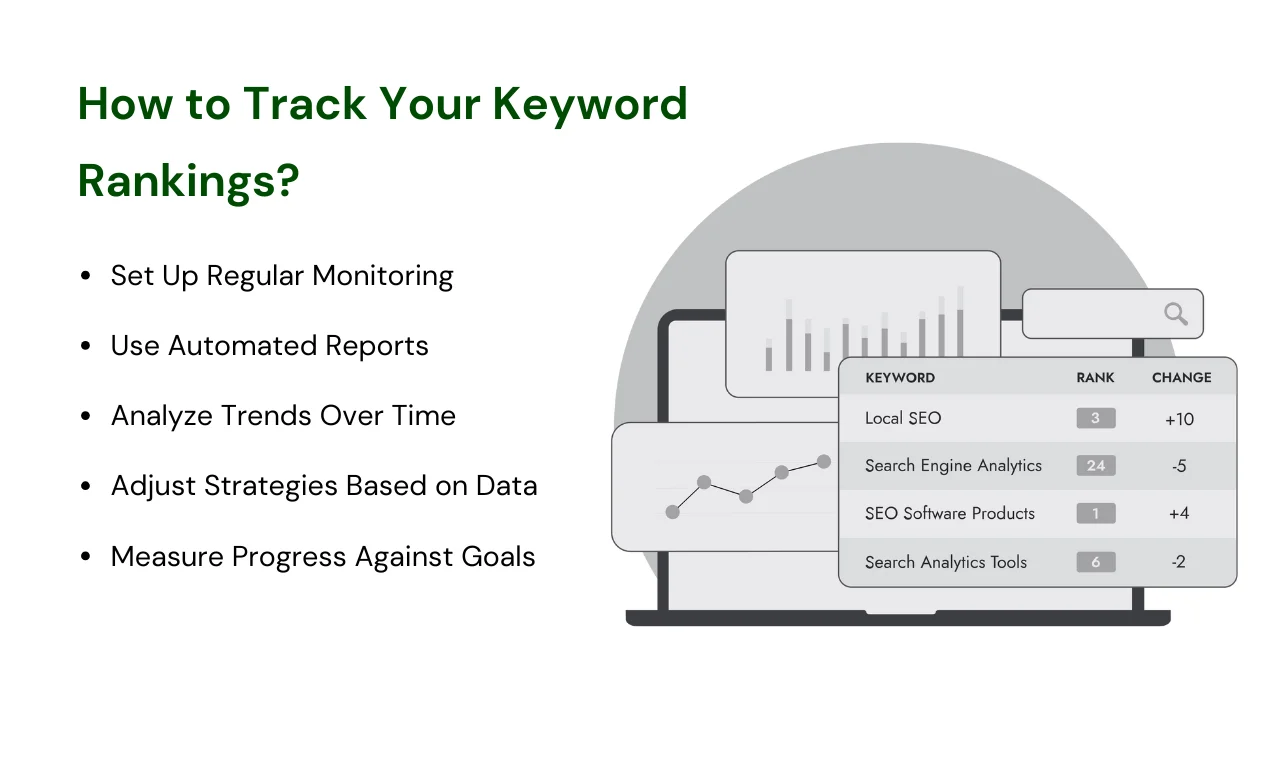
1. Set Up Regular Monitoring
It is crucial to set fixed intervals of time for checking your keyword rankings so that they can be aware of the status of the site for changes in tracking.
2. Use Automated Reports
Use instruments that possess reporting capabilities as this is time-saving and enables you to gain insights rather quickly.
3. Analyze Trends Over Time
You should find out the trends in your keywords’ ranking to locate exactly what strategies are effective and where they are inefficient.
4. Adjust Strategies Based on Data
If you’re using SEO then you should change certain approaches according to the best results that you get from the particular analysis that you do.
5. Measure Progress Against Goals
You should compare the outcomes with the goals you have laid down to assess the effectiveness of the efforts that have been laid down to develop new and better ways of performance.
Conclusion:
Ranking of the keywords is a crucial factor in determining the effectiveness of the online promotion, because it affects visibility, traffic, and credibility, as well as giving a competitive advantage. That’s why, it is essential for any business that is operating online to fully comprehend how they function and how their performances can be constantly checked and enhanced.
The tools and tips provided in this guide should be adopted to achieve the set SEO goals and optimizations on your keyword. If you need help with SEO, you should consider cooperation with Three Angle Marketing. Being an expert in keyword rankings, our team will ensure you are successful in your new or existing marketing career.

